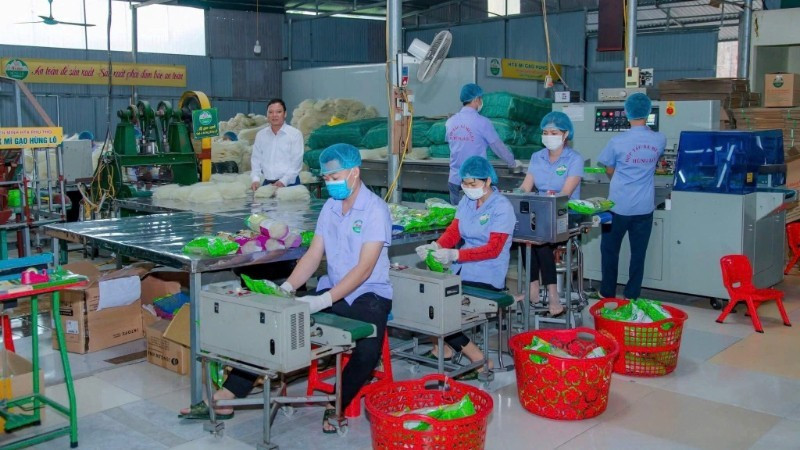Investment in deep processing technology helps elevate Vietnamese agricultural products
Some 90% of Vietnamese agricultural products are still exported in raw form, according to the Ministry of Agriculture and Environment. This remains a major disadvantage, leaving Vietnamese products subject to price suppression and instability in many demanding markets.

The agricultural sector is striving to invest in deep processing technology to increase value of agricultural products and solve the problem of “bumper harvests, falling prices.”
When cooperatives and enterprises engage in advanced agricultural processing, they can more easily access a wider range of markets, achieve higher product value, and bring greater benefits to local communities.
Investing in deep processing to increase value
Over the past decade, the Hoa Le Clean Dragon Fruit brand in Ma Lam Commune in the the Central Highlands Province of Lam Dong has become familiar not only to local residents but also to those in neighbouring areas.
Established in 2017, the Hoa Le Clean Dragon Fruit Cooperative has 18 official members and 34 associate members, mainly focused on producing and trading dragon fruit products.
To date, the cooperative has expanded its business activities and deepened processing of dragon fruit into products such as dragon fruit spirits, dragon fruit wine, mineral water, dragon fruit juice concentrate, dragon fruit flour-based cakes, and essential oils. As a result, its working capital has grown from an initial 900 million VND to 2.5 billion VND (34,400 USD - 95,500 USD).
Do Thanh Hiep, Director of the Hoa Le Clean Dragon Fruit Cooperative, shared that the cooperative currently has nine dragon fruit products certified with a 3-star OCOP rating.
To stabilise and further expand production, the cooperative is strengthening partnerships, expanding its markets, and aims to increase dragon fruit output to 8,000–12,000 tonnes per year. It also continues to recruit members and expand the certified cultivation area with the hope that it can export to demanding markets such as the European Union (EU), the Republic of Korea, and Japan.
Thanks to investment in modern pre-processing facilities, cold storage, machinery, and a synchronised production process meeting GlobalGAP and VietGAP standards, the cooperative’s dragon fruit products are now being favoured by customers on e-commerce platforms. It has signed supply contracts for fresh dragon fruit through production chains with three other dragon fruit cooperatives — Ham Duc, Ham Phu, and Thuan Minh — as well as with cooperative groups and farming households covering over 200 hectares.
Additionally, the cooperative also signed contracts to supply dragon fruit to export-import companies such as Ant Farm, Yasaka (fruit processing), and Comex Farm.
Technology application to enhance product value is also the chosen path for many agricultural cooperatives and businesses, including the Hung Lo Rice Noodle Cooperative in Van Phu Ward, Phu Tho Province.
By applying science and technology, Hung Lo Rice Noodle Cooperative’s products have gained a place at the consumer market, with deep penetration into supermarket chains, restaurants, and distribution networks in many localities nationwide. Its products are available in supermarket chains such as Big C, Coopmart, OCOP store chains, Vinmart, and Aloha. On average, the cooperative sells 3–4 tonnes of finished rice noodles per day.
According to Cao Dang Duy, Director of the Hung Lo Rice Noodle Cooperative, besides dominating the domestic market, Hung Lo rice noodles have also been exported to Japan and Taiwan (China). Currently, the cooperative has three product lines certified with a 4-star OCOP rating and eleven product lines certified with a 5-star OCOP rating.
Thanks to investments in new technological machinery, the cooperative has also helped create jobs for low-income and near-poor households in the area, with an average monthly income of 6–7 million VND per person.
Challenges in key markets
The Ministry of Agriculture and Environment reports that in the first half of the year, total agricultural, forestry, and fishery export turnover reached 33.84 billion USD, up 15.5% compared to the same period last year. However, it must be frankly acknowledged that the growth in agricultural exports remains unstable due to global geopolitical fluctuations.
Therefore, the ministry recommends that each export sector develop production and business plans that adapt to challenges in key markets, while also proactively expanding into new markets.
According to the Phu Tho Department of Agriculture and Environment, during the process of building product brands, to enhance competitiveness and value, the agricultural sector has been promoting the transfer, application, and innovation of technology for businesses, cooperatives, and households, encouraging and supporting farmers to adopt clean, organic, and high-tech production.
As a result, Phu Tho Province has developed valuable crops and many new processed agricultural products that deliver clear economic benefits, reduce environmental pollution, and meet the growing demands of the market.
“We aim to increase investment in technology to improve quality, preserve agricultural products longer, and reduce input costs to maintain the best price for finished products. We will also actively expand to markets in Japan, theh Republic of Korea and Southeast Asia to reduce risks in exports,” said Duy.
To establish a new production strategy adapted to global competition, the Director of the Hoa Le Clean Dragon Fruit Cooperative noted that the cooperative is stepping up its production chain towards deep processing, increasing training, and providing technology and technical transfer support to its members.








